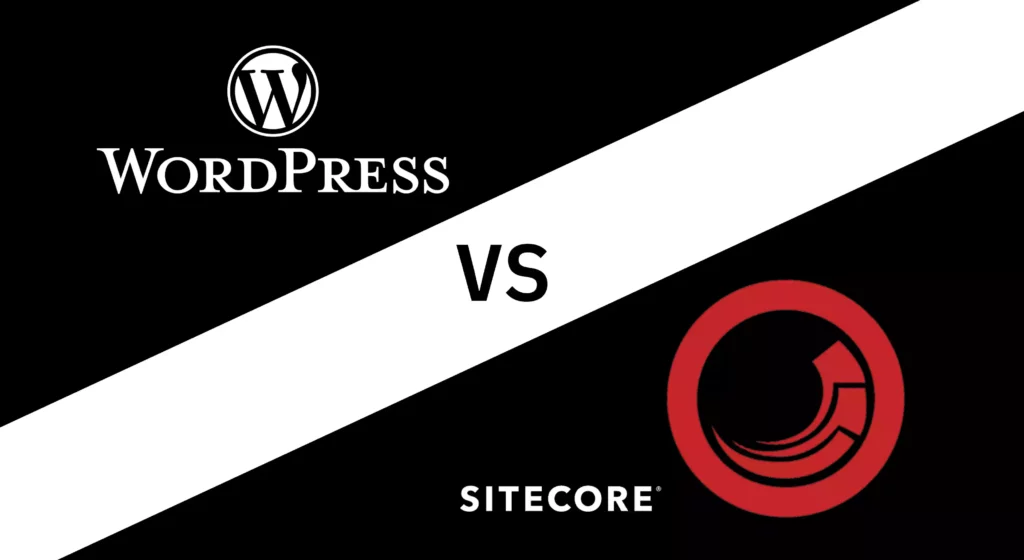Are you looking for the right content management system to power your organization’s website?
Sitecore and WordPress are two very popular options.
Both Sitecore and WordPress are popular for building websites, but there are several key differences between them that make one more suitable than the other, depending on the specific needs of your organization.
When it comes to selecting a CMS for your organization, the choices can be overwhelming. With an array of options available in the market today, deciding which one is best suited for you requires careful consideration and evaluation.

Explore and compare: Sitecore vs WordPress. From popularity and cost, we’ll explore the security of both platforms, discuss the differences when managing content, and dig into the benefits of each for maximizing your message and impact.
Comparing WordPress and Sitecore

Two leading CMS platforms are WordPress and Sitecore; each has its own set of unique features, capabilities and target user bases.
WordPress is really popular…
WordPress is the world’s most popular CMS platform with an estimated 60 million users worldwide, according to W3Techs latest report, powering some “62.8% of all the websites whose content management system we know. This is 43.3% of all websites” explains W3Techs. For quick comparison, Sitecore powers just .1% and is declining in popularity.
With WordPress’ popularity on the rise, users understand WordPress can be used to build a wide range of digital experiences from simple blogs to complex multi-site enterprise deployments.
WordPress’ power lies in its flexibility. With over 60,000 free plugins and hundreds of wildly successful paid plugins, there’s likely a plugin for any functionality your organization needs.
Sitecore serves a specific need
Sitecore is (obviously) a more enterprise-focused CMS. And, it is widely used by large organizations to manage their digital experiences. Sitecore’s strength lies in its ability to quickly and efficiently scale up for global deployments; it also has an extensive library of features designed specifically for the management of complex multi-site solutions such as Sitecore Experience Platform.
The reason many orgs choose Sitecore is because of its powerful marketing automation capabilities, support for multiple languages, and intuitive multivariate testing tools. As we’ll see later in this article, though, many of these features are already a part of WordPress, or available in packages from developers who have built really solid solutions independently.
This realization is just one factor that is leading big brands to reconsider Sitecore, with many making the switch to WordPress.
Which is an easier publishing platform?
When it comes to publishing online, many suggest WordPress has a number of advantages that are hard-met by Sitecore.
What’s important to note, though, is that success is determined by more than just the platform you use; it requires strategic planning and consistent optimization to stay on top.
Sitecore has its own set of advantages when it comes to online publishing; most notably, its built-in analytics and reporting capabilities are robust enough for companies with large sites.
This analytics and reporting, compared to WordPress, better allows marketers a deeper level of control, tracking visitors’ paths through the website which provides insight for improving user experience.

Analysis of Sitecore Security vs WordPress Security
When it comes to security, both WordPress and Sitecore provide robust protection; however, their approaches are somewhat different.
Installing new plugins on a WordPress site can introduce potential vulnerabilities that attackers may exploit. Even disabled or deactivated WordPress plugins can slowdown your site and introduce vulnerability for brute force or other intrusions. For this reason, it is essential to ensure that WordPress and any installed plugins are kept up-to-date with the latest security patches and updates.
Sitecore’s security is built-in, with no need to install additional plugins or updates. Its .NET framework utilizes Code Access Security (CAS) which makes it more difficult for malicious actors to gain access and exploit vulnerabilities. Sitecore receives frequent updates which ensures that any newly discovered threats are addressed quickly and efficiently.
We think the security considerations are a tie in this case – both CMS provide strong protection against malicious actors as long as the platform and its associated components are properly maintained.
Pricing of Sitecore vs costs of WordPress
When comparing WordPress vs Sitecore, cost is a key factor to consider.
WordPress requires no upfront license fees and the software itself can be freely downloaded; however plugins or extensions may require separate licensing which should be taken into account when assessing your overall costs of ownership.
Sitecore license cost and pricing
Sitecore on the other hand incurs up-front licensing fees with ongoing maintenance costs; this means that while initial costs of ownership may be higher, these will decrease over time as your usage increases.
Sitecore is a more expensive option, with licensing fees starting from $48,000 and ongoing license costs each year; however it’s high degree of functionality and scalability justify the cost for larger organizations looking to build sophisticated digital experiences which require significant customization.
Content Management: WordPress vs Sitecore
There are several key differences between Sitecore and WordPress:
- Proprietary vs. Open Source: Sitecore is a proprietary CMS, which means that it is owned by a company and licensed to users for a fee. WordPress, on the other hand, is an open-source CMS that anyone can use for free.
- Target Audience: Sitecore is primarily designed for enterprise-level businesses that require complex workflows, personalization, and multi-site management capabilities. WordPress, on the other hand, has a broader target audience and can be used by individuals or small businesses without much technical knowledge.
- Ease of Use: While both platforms have user-friendly interfaces, WordPress tends to be easier to use because of its intuitive dashboard and simpler architecture. Sitecore requires more technical knowledge and experience to fully understand and use effectively.
- Customization Options: Both platforms offer customization options through themes or templates with drag-and-drop interfaces; however, Sitecore offers greater flexibility in terms of customizing individual content components or modules within pages compared to WordPress where customization may require coding expertise.
Overall, we find it’s important to consider your organization’s needs when selecting between these two CMS’s including budget constraints (licensing costs plus potential developer/consultant costs), scalability requirements (based on whether your business has multiple sites or requires granular workflow management), ease of use by non-technical users within your organization etc., before making a final decision either way
Content management in WordPress is a dream
Content management in WordPress is easier than in Sitecore.
WordPress makes it a lot more simple and intuitive, it’s all about the user interface. The WordPress dashboard is designed with non-technical users in mind, making it easy for anyone to manage content without requiring extensive technical knowledge.
We like WordPress over Sitecore for content management because of WordPress features like:
- Easy / fast post management system that’s intuitive
- Themeing is very developed in WordPress
- Custom content types are easy
In contrast, Sitecore is a more complex platform that requires a steep learning curve and specialized technical expertise to manage content effectively. Sitecore’s user interface can be challenging for non-technical users.

Overall, while both platforms are capable of managing content effectively, WordPress offers a simpler and more accessible approach to content management compared to Sitecore.
Content Management Features in Sitecore
Sitecore is a comprehensive content management platform that offers a range of advanced features for managing content. Some of the key features of Sitecore include:
- Content creation and editing: Sitecore provides an intuitive user interface for creating and editing content, including rich text editors, image galleries, and media libraries.
- Content personalization: Sitecore allows users to create personalized experiences for visitors based on their behavior, preferences, or past interactions with the website.
- Workflow management: With Sitecore’s workflow management capabilities, users can set up approval processes to ensure that all content meets specific quality standards before publication.
- Multi-site management: Sitecore allows users to manage multiple websites from a single platform, making it ideal for large organizations with complex web properties.
- Analytics and reporting: Sitecore offers powerful analytics tools that provide insights into visitor behavior and engagement levels across different channels and touchpoints.
Overall, these features make Sitecore an ideal solution for enterprise-level businesses looking to centralize their digital marketing efforts and streamline their content management processes.
Licensing Sitecore vs WordPress
The licensing for Sitecore and WordPress is very different.
Sitecore is a proprietary CMS, which means that its codebase is owned by the company that created it, and licensing fees must be paid to use it. The cost of Sitecore’s licenses can be quite high, especially for larger enterprises with complex website needs. Basically, Sitecore often requires the assistance of specialized developers or consultants to install and customize the platform, which adds an additional expense.
In comparison, WordPress is an open-source CMS that anyone can use for free. There are no licensing fees associated with using WordPress itself. However, depending on the requirements of your website or business, you may need to pay for hosting services or premium plugins or themes.
Overall, while cost may not be the only factor in deciding between Sitecore and WordPress as a CMS solution (since other considerations like features and scalability matter), it certainly plays an important role in budgeting decisions for web development projects.
Questions to ask yourself when considering Sitecore vs WordPress
If you are considering a CMS for your organization, here are some questions to ask yourself when evaluating Sitecore and WordPress.
What kind of budget is available for the project?
WordPress is free to use, while Sitecore requires an investment. However, WordPress may require additional features that need to be purchased from third-party providers.
Is WordPress an Enterprise-level CMS?
Yes, definitely. WordPress is capable of serving as an enterprise-level CMS. While WordPress is often thought of as a platform for small to medium-sized businesses or personal blogs, it scales up to meet the needs of large enterprises.
Some of the world’s largest companies use WordPress as their CMS, including The Walt Disney Company, Time Inc., and Sony Music. In addition, many organizations that require complex workflows and personalized experiences rely on WordPress for content management.
WordPress offers a variety of features that make it suitable for enterprise-level use, such as:
- Scalability: With its ability to handle large amounts of traffic and content, WordPress can easily grow with your business.
- Customization: Thanks to its open-source nature and vast developer community, WordPress allows for extensive customization through themes and plugins.
- Security: Security is a top priority for enterprises, and with ongoing updates and a strong security framework in place, WordPress offers robust security measures to protect sensitive data.
- Accessibility: The user-friendly interface makes it easy for non-technical users within an organization to manage content on the platform without requiring extensive technical knowledge.
Overall, while there are many other enterprise-level CMS options available on the market today like Sitecore or Adobe Experience Manager (AEM), don’t underestimate the capabilities of WordPress when it comes to powering high-traffic sites or managing complex content workflows at scale.
Does Sitecore offer the features I need?
As for features, Sitecore is a powerful CMS that offers many advanced capabilities such as content personalization, multi-site and multi-language support, marketing automation tools, A/B testing and analytics. If these are features your organization requires or will require in the future then Sitecore should be a strong consideration.
It is important to remember though, that pretty much anything you can imagine is possible with WordPress. For most organization’s, any features needed are available as a plugin and purchasable with annual license fees typically in the range of $45-$300 per year.
Will the costs of Sitecore be “worth it”?
When it comes to cost, there is a wide range between WordPress and Sitecore. Whereas WordPress’ open-source nature makes it free to use, Sitecore can be quite expensive.
According to the company’s pricing page on their website, the license cost of Sitecore starts at over $20k per year (plus setup costs), which can quickly add up for large deployments. Adding in the costs of development and maintenance, and typical Sitecore budgets are over $250,000 per year. For some organizations, this is perfectly acceptable; for others, the approachability of WordPress’ pricing model will be more appealing.
How will content be managed?
When content changes are required, will a member of your organization’s team be responsible and if so, how technically capable are they? Both platforms are relatively easy to use, but Sitecore’s interface is a bit more complex than WordPress.
You may find that you need a dedicated development team to ensure your Sitecore deployments are handled correctly and efficiently.
What are the security concerns?
Both platforms offer varied levels of security for your website; however, they should both be monitored regularly as well as updated regularly. Security is a major concern for any website and both Sitecore and WordPress have robust security protocols in place.
How important is content in your marketing plan?
Content editors may be more familiar with the tools in WordPress (like Yoast) and most website owners find the tools available for search administration are more comprehensive in WordPress. Sitecore’s optimization features are minimal and the flexibility just isn’t there without getting really involved.
Ultimately, the choice between Sitecore and WordPress will depend on what matters to you most; each has its own strengths that must be weighed against your specific needs.
Commons questions we get about Sitecore in comparison to WordPress:
Is Sitecore similar to WordPress?
Yes, both Sitecore and WordPress are enterprise-grade content management systems used by leading organizations globally. Over 40% of the websites on the internet used WordPress. While there are some similarities between the two, Sitecore as a platform offers more advanced features, but most all this functionality is easily replaced by plugins in WordPress. That being said, WordPress does have its advantages in terms of cost-effectiveness and ease of use. Ultimately each platform has different strengths that make it better suited to certain applications.
Is Sitecore better than WordPress?
No, not at all. Though Sitecore advertises many “advanced features”, this functionality may prove to be somewhat lackluster, or lack some desired functionality you expect, or may be difficult to set up or maintain for some users. Overall, the right tool for you completely depends on the needs of your organization and your website. Generally speaking, WordPress is less expensive and easier to use, with similar functionality and capability. It’s best to evaluate both platforms against your specific requirements before making a decision on which one is better suited for you.
How is Sitecore different than other CMS?
Primarily speaking, Sitecore markets their platforms as the “platform for rich customer experiences, from content to commerce” but the functionality, cost, and complexity to develop these experiences may be surprising. The difference that sets Sitecore apart from other solutions lies primarily in the company’s marketing and product team. The underlying solution/platform isn’t unique, and achieving the same results, for some organizations, may be prove more realistic with CMS like WordPress.
Ultimately, the right tool for you completely depends on the needs of your organization and its website requirements.
Is it easier to develop sites with Sitecore or WordPress?
Ease of development depends on the individual’s technical proficiency (or the technical capacity of your team) and familiarity with each platform. Generally speaking, WordPress is easier to set up and work with than Sitecore, so if you are looking for the simpler platform for managing a website, then WordPress may be the better option.
With a wider availability of experienced WordPress developers and WordPress development companies, many clients find themselves better prepared with WordPress than SiteCore.
WordPress is more cost-efficient, but can Sitecore deliver better ROI?
When it comes to pricing and overall cost to operate, WordPress has a distinct advantage over Sitecore.
Because of its open source nature, there is no licensing fee associated with the platform – users only need to pay for hosting and any premium plugins or add-ons they may require; this makes it an ideal solution for organizations of any size.
Sitecore, on the other hand, is a proprietary CMS that comes with substantial licensing fees; this may be prohibitive to some businesses but also provides them access to features and capabilities they wouldn’t have otherwise.
Next steps for your organization:
If your organization is currently using Sitecore and thinking of making the switch to WordPress, explore our website and get to know some of the solutions we offer that could help you avoid continued licensing costs and escape to a manageable solution that meets your organizations needs. Our enterprise migration solutions include migration from Sitecore to WordPress, including 1:1 migration and redesigns.

